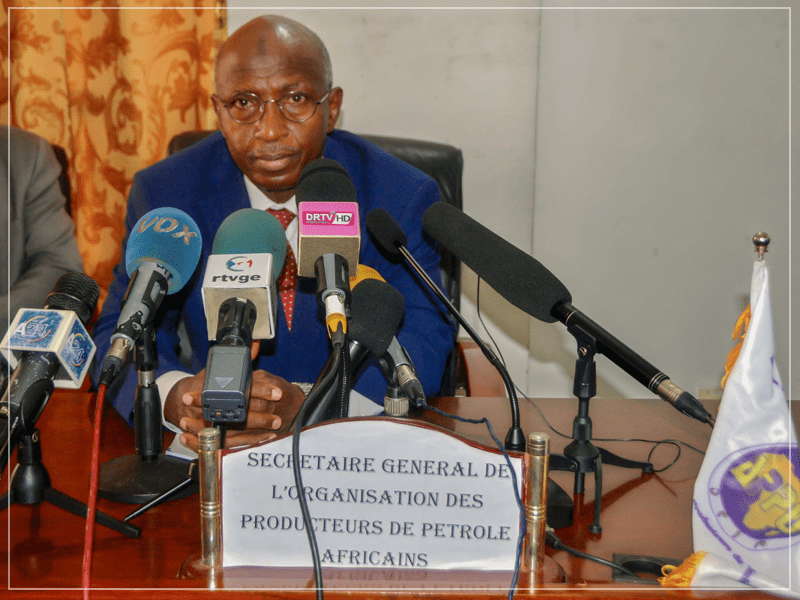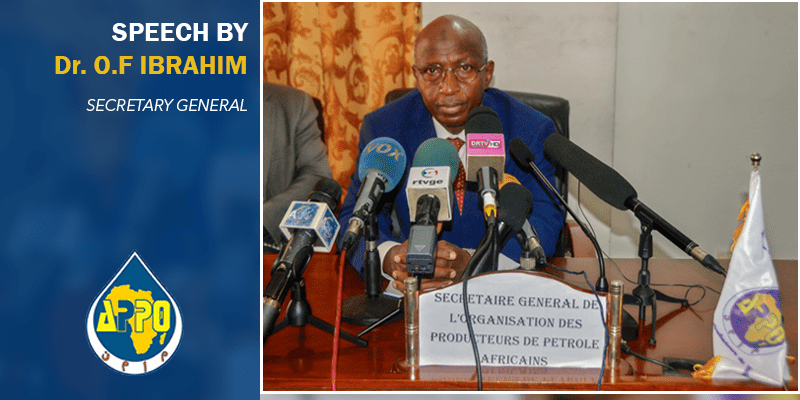
Your Excellency, Firmin AYESSA, Deputy Prime Minister representing the Prime Minister;
Excellency the Minister of Hydrocarbons and Member of the Council of Ministers of APPO;
Excellency the Minister of Foreign Affairs, Cooperation and Congolese Abroad;
Your Excellency the Minister of Justice;
Excellencies, Ambassadors of APPO Member Countries accredited to the Republic of Congo;
Distinguished advisers of the Presidency and top government officials,
The Managing Director of Africa Energy Investment Corporation, AEICORP;
Republic of Congo’s Representative on the Executive Board of APPO,
My colleagues members of Management and Staff of the APPO Secretariat;
Other invited guests,
Gentlemen of the press;
Ladies and Gentlemen;
We are most delighted today with this Headquarters Agreement signing ceremony, which marks the formal return of APPO to its permanent headquarters, in Brazzaville, Republic of Congo.
I recall that the Council of Ministers of APPO, at its 38th Session on June 15, 2020 unanimously passed a Resolution to move the headquarters of APPO from its temporary location in Abuja, Nigeria, to the permanent headquarters in Brazzaville, the Republic of Congo. The Council also considered and approved the new Headquarters Agreement between the Republic of Congo and the African Petroleum Producers’ Organization.
It will be recalled that APPO’s Headquarters was temporarily transferred to Abuja in April 2018 when Nigeria assumed the Presidency of APPO with the mandate to carry out the approved program of reform of the Organization.
During this reform, new minimum requirements to host APPO Headquarters had been approved and the right to host the Headquarters was opened to all interested APPO Member Countries.
Four Member countries namely Egypt, Equatorial Guinea, Federal Republic of Nigeria and the Republic of Congo, the host country, had expressed their interest. The three new applicants for the right to host the APPO Headquarters subsequently withdrew and left the Republic Congo as the sole candidate.
A nine-member ministerial delegation led by the President of APPO HE Foumakoye Gado, visited Brazzaville in February 2020 to assess Congo’s degree of compliance with the minimum requirements and welcomed the result, which led to the Ministerial Resolution to return the Headquarters to Brazzaville.
Excellencies, Distinguished guests, the major reform exercise that the Organization went through in the last couple of years gave us a good opportunity to reflect on what APPA had been doing in its 33 years of existence and whether it has the capacity to tackle the current and future challenges staring the African energy industry in the face. We came to the conclusion that a lot has changed in the global energy scene since APPA was founded in 1987 and a lot more will change in the coming years. These changes will have huge impacts on the economies and peoples of our member countries.
A number of short, medium- and long-term challenges for the African Oil and Gas Industry were identified. It is apt to mention only two at this time. The first and immediate challenge is that of the impact of COVID-19 on the economies of our countries and the lives of our people. COVID-19 brought to the fore some of the major weaknesses of the oil and gas industry in our member countries. Although COVID-19’s impact is felt globally, the impact is not uniform across countries, even within Africa. Countries that rely heavily on export revenue for their day-to-day administration, like our Member Countries, are more hard-hit.
At the meeting of the APPO Council of Ministers last June, for example, the Secretariat, at the request of the Republic of Congo, presented a Report on the short and long term impact of COVID-19 on the economies of APPO Member Countries. That Report highlighted the grave danger that our Member Countries face over their heavy dependence on external markets for their export revenue, FDI, oil and gas technology etc. The study noted that the economies of our Member Countries are more prone to global shocks than other economies that are not dependent on oil and gas revenues.
The second challenge is the global paradigm shift away from fossil fuels to renewable energy. As an organization of countries whose economies are heavily dependent on oil and gas revenue, we had taken a critical look at the Paris Climate Change Agreement popularly called COP-21 to which world leaders, including our own leaders, have committed. We asked ourselves, what becomes of the economies of our Member Countries that are heavily dependent on hydrocarbon export revenue if all the goals of COP-21 are met? How prepared are our countries for a fossil fuel free world economy? We reflected on the future of the oil and gas industry in Africa in the light of global paradigm shift on energy sources. We noted that the developed countries have already initiated measures against fossil fuel use including but not limited to:
a. Fossil fuel divestment
b. Penalties for the use of fossil fuels,
c. Discrimination in the use of fossil fuels;
d. Introduction of subsidies on renewables
We also noted the following:
- that the oil and gas industry is a highly capital intensive and technology-driven industry;
- More and more oil and gas finds are being made in Africa, but our individual countries have neither the resources nor the technology to harness these resources for the maximum benefit of our peoples;
- Our Member Countries have been compelled, in most cases, to rely on IOCs to finance exploration, production, processing and even marketing of our oil and gas resources;
- Cross border energy infrastructure within the continent is near non-existent;
- In the wake of COP-21 where the home governments of these IOCs are imposing restrictions on investments in hydrocarbons, the IOCs have no choice but to comply with the regulations of their home governments, leading to a shortage of financing for hydrocarbon projects;
- In a few years from now, African countries that rely heavily on FDI for their oil and gas sector development will see that source of funding dry up and their oil and gas industry will die a natural death.
The implication of the success of COP 21 is that poor countries that God has blessed with abundant oil resources like APPO Member countries cannot use it to develop their economies especially in the long term because there will not be market for them, either because discriminatory policies would have succeeded in eliminating whatever cost advantage oil has over renewables or global paradigm shift against fossil fuel use has made its use very unpopular, or more stringent penalties will be imposed and enforced on countries that deal with fossil fuels.
Excellencies, these challenges are real. Challenges of funding, of technology and of energy infrastructure. The time has come for us to strategize to ensure that we get the maximum benefit of our resources. But we cannot do this as individual countries. As individual countries, we do not have the finances. We do not have the technology. The infrastructure is almost non-existent. But if we pool resources together, we can surmount the challenges. Even more developed countries have found it necessary to collaborate to achieve economic objectives.
And this is the new focus of our Organization. It is a huge task. But we are determined to succeed for the good of our Member countries and our peoples.
In this regard, I am pleased to inform your Excellencies that the Council of Ministers of APPO approved the establishment of the African Energy Investment Corporation, AEICORP, to replace the old APPA Fund for Technical Cooperation, whose Managing Director is here with us. The mission of this new institution is to finance the development of hydrocarbons and energy sector infrastructure in Africa. Unlike its predecessor, the APPA Fund which was wholly owned by APPO Member Countries Governments, AEICORP is a public/private partnership. Our governments are stakeholders, but so is the private sector both in Africa and outside. As the consultants engaged by AEIRCORP to raise the equity of the corporation come to Congo for your subscription, I wish to appeal to both the government and private investor to subscribe to the project. I assure you that it is one investment that you will all be happy that you made.I believe half the battle has been won. The APPO Ministers have approved and are committed to the recommendation of the Consultants on raising the professional profile of the Secretariat to match or exceed similar international and inter-governmental energy organizations in order to tackle the new challenges facing the African oil and gas industry.
They have approved an increase in the number of local and professional staff for the Organization as well as the use of consultancies where necessary, while the Secretariat grows its research capabilities.
And the government and good people of the Republic of Congo have graciously provided a conducive working environment and residence for us to excel. Indeed, since our return to Brazzaville, the staff of APPO Secretariat have felt very much at home, with the hospitality we have received wherever we went. We look forward to the completion of our permanent Secretariat building at Tower B of the Tours Binoculars in the city center. The completion of that permanent Secretariat will allow us to fully employ all the approved staff of the Organization as the current temporary office located on the 7th floor of BSCA building can accommodate only a fraction of the approved manpower for the Organization.
Recognizing the serious challenges posed to our Member Countries economies by both COVID-19 and COP 21 among other challenges, APPO Ministers sought support at the highest levels of our Member Countries. This led to the decision to hold a Summit of Heads of State and Governments of APPO Member Countries in Brazzaville sometime in 2021. I should like to congratulate the Republic of Congo for its choice as the host of the first APPO Summit.
Excellencies, ladies and gentlemen;
The Headquarters Agreement that we have just signed is the last of a series of activities we have taken in the last 5 months to relocate to Brazzaville, from transferring personnel to equipment and the seat of the headquarters.
Our satisfaction, and everyone can understand it, is now complete. I should like to use this opportunity to express on behalf of the Organization, our gratitude to the President of the Republic of Congo, His Excellency DENIS SASSOU NGUESSO, for his unflinching support and for giving his very high approval for the signing of this Headquarters Agreement between the Government of the Republic of Congo and the African Petroleum Producers’ Organization, APPO. I should also like to acknowledge and thank His Excellency Mr. Clément MOUAMBA, the Prime Minister for his commitment to the cause of APPO, which was clearly demonstrated when the APPO Ministerial delegation visited Brazzaville last February. We also recognize the role and support of the Ministers of Foreign Affairs, Cooperation and Congolese Abroad and that of Justice. I also would like to express our deep appreciation to my Minister, the Minister of Hydrocarbons and to congratulate him for his diplomatic success in bringing back the headquarters to its original seat.
We also want to thank the good people of Congo who have been excellent hosts to us for the past three decades.
Finally, I would like to assure the Government of the Republic of Congo and especially His Excellency the Minister of Foreign Affairs, that the Council of Ministers of APPO and its President as well as myself as Secretary General will ensure the scrupulous respect of the provisions of this Headquarters Agreement, by applying it to the letter, for the building of a credible, modern and more visible Organization in the service of the citizens of our Member Countries.
Long live to African Cooperation,
Long live to APPO,
I thank you Excellencies for your kind attention.

